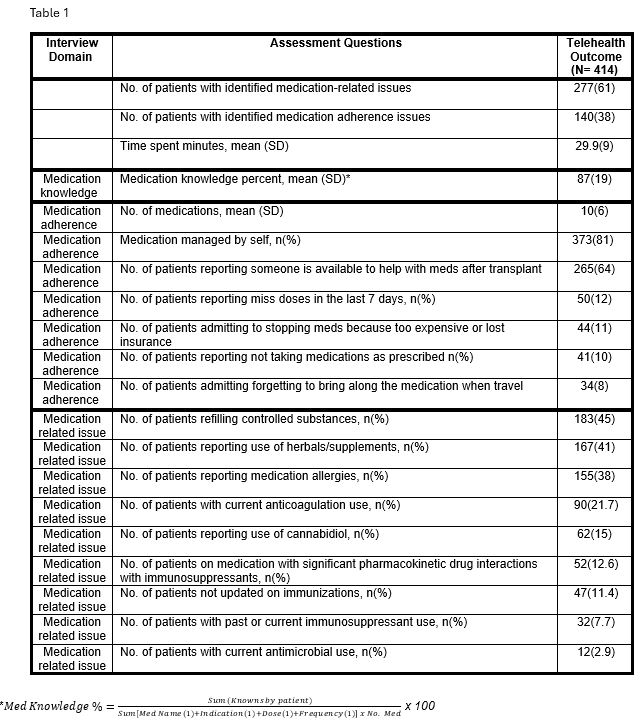Transplant pharmacist participation in suitability evaluation using telehealth: Single center experience
Yiwen Chung1, My Duong Patterson1, Benito Valdepenas III1, Maya Campara1,2.
1Pharmacy Practice, University of Illinois at Chicago, Chicago, IL, United States; 2Surgery, University of Illinois at Chicago, Chicago, IL, United States
Introduction: Multidisciplinary assessment of transplant candidates is standard practice. Pharmacist involvement has been previously described. Responsibilities of transplant pharmacist include identifying medication related issues, and potential barriers to medication adherence after transplantation. This is the first study that describes transplant pharmacists’ participation in candidate suitability determination via telehealth.
Methods: Single-center, retrospective, descriptive study of all adult transplant candidates that underwent kidney transplant suitability evaluation at a large, urban, transplant program from 9/2020 to 8/2021. The primary outcome is to characterize medication adherence barriers and drug related issues identified by pharmacists. The secondary outcome is to report the average incidence of each potential barrier documented within the suitability evaluation notes.
Results: During study period, 632 patients underwent pre transplant suitability evaluation. We present data for 414 kidney transplant candidates for whom the average age was 55, 50% identified as Black and 63% as male. Pharmacists interview consisted of 17 questions that covered three main domains: identifying medication related issues (52.9%), medication adherence (41.2%) and medication knowledge (5.9%) as seen in Table 1. On average, patients were taking 10+/-6 medications and calculated medication knowledge percent was on average 87+/-19. Pharmacist identified 277 (61%) patients with drug-related issues and 140 (38%) patients with potential adherence issues. Most frequently documented medication related issue was use of controlled medications (45%), followed by herbals/supplements use (41%), medication allergies (38%) and anticoagulant use (21.7%). Adherence questions were designed to understand coping mechanism with medication related problems and included questions about self-adjusting medication therapy, handling medication access issues or travel related issues, and examining medication support systems at home.
Conclusion: Pharmacists’ participation in suitability determination via telehealth results in identification of important issue that could become adherence barriers and complicate patient care in the perioperative and postoperative phases of care.

[1] Transplant Suitability
[2] Candidate Evaluation
[3] Adherence Barriers
[4] Transplant Pharmacist
